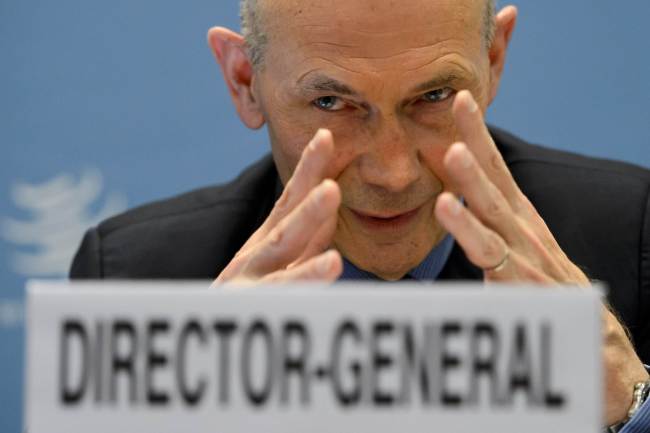GENEVA (AFP) ― Global commerce is set to grow by 3.3 percent this year, the World Trade Organisation said on Wednesday, as persistent gloom in Europe led it to cut a previous forecast of 4.5 percent.
The announcement marked the second time that the WTO has reined in its figures for 2013, after initially estimating that world trade would expand by 5.6 percent.
“The final trade figures for 2012 are quite sobering,” WTO director-general Pascal Lamy told reporters before adding that 2013 would see “more of the same.”
 |
WTO Director-General Pascal Lamy gestures during a press conference at WTO headquarters in Geneva on Wednesday. ( AFP-Yonhap News) |
Last year, the WTO said, global commerce expanded by 2 percent, well below the growth in 2011 of 5.2 percent.
It is increasingly clear that the world economy is running at “double speed,” with developing countries outperforming richer nations, Lamy emphasised.
The WTO explained in a statement that “improved economic prospects for the United States in 2013 should only partly offset the continued weakness in the European Union, whose economy is expected to remain flat or even contract slightly this year according to consensus estimates.”
“China’s growth should continue to outpace other leading economies, cushioning the slowdown, but exports will still be constrained by weak demand in Europe,” it added.
As a result, this year looks set to be a “near repeat” of 2012, with both trade and output expanding slowly, though trade was expected to pick up a bit next year. “Our view is that 2014 should be looking more like 5 percent growth,” Lamy said.
Last year, the value of world merchandise exports only increased by 0.2 percent to $18.3 trillion, the WTO noted.
The trend was driven by falling prices for traded goods, with commodities such as coffee, cotton, iron ore and coal seeing major drops, while oil was relatively stable.
The value of global commercial services exports rose by 2 percent to $4.3 trillion meanwhile.
Lamy said that the gap between growth in developed and developing nations should continue, with the latter being major beneficiaries of trade expansion.
“In my view this is here for quite a time ahead,” said the Frenchman, who in September wraps up his second mandate as the WTO chief.
Asked whether that spotlighted policy failings in developed countries, Lamy responded: “There is one thing for sure, there’s a good, solid way to generate growth, and that’s structural reform.”
“Refocusing on trade is a good bet, but there are political costs,” he acknowledged.
The 158 economies which make up the WTO set trade rules among themselves in an attempt to ensure a level playing field and spur growth by opening markets and removing trade barriers, including subsidies, excessive taxes and regulations.
Created in 1995, the WTO launched its Doha Round of talks in 2001 with the stated aim of underpinning development in poorer nations.
But the talks have faltered in the face of obstacles set in particular by China, the EU, India and the United States, and Lamy’s successor, still to be chosen, will face the tough task of reviving them.








![[Weekender] Korea's traditional sauce culture gains global recognition](http://res.heraldm.com/phpwas/restmb_idxmake.php?idx=644&simg=/content/image/2024/11/21/20241121050153_0.jpg)